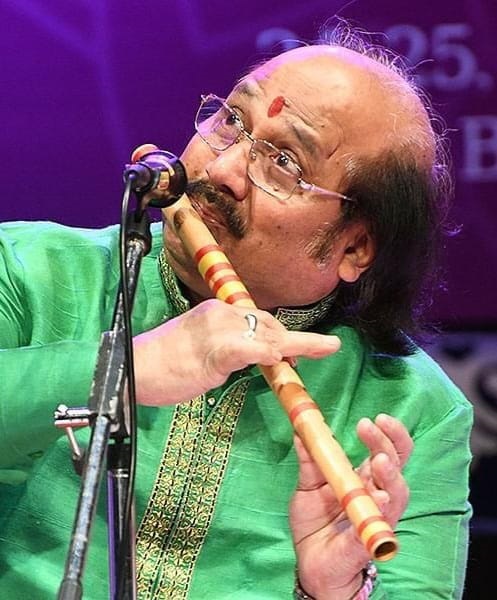
Pt. Ronu Majumdar is an Indian Flautist in Hindustani Classical music tradition. He is considered for the most respected name of the Indian music field, style maker and powerhouse performer, firmly rooted in the Maihar Ghrana. He has been honored with numerous remarkable awards including SNA award in 2014.
In 1981, Ronu Majumdar won the first prize at the All India Radio competition, and the President’s Gold Medal.
He has associated with Pandit Ravi Shankar on albums like Passages and Chants of India. He has more than 30 audio releases to his credit. He won the prestigious Aditya Vikram Birla Award in 1999 for his dedication to music. Sahara India Pariwar felicitated him with a lifetime achievement award on the occasion of Jyoti Diwas 2001. In 2014 he won the prestigious Sangeet Natak Akademi award.
In a candid conversation he gives insights about his journey in classical music.
Excerpts:
Q. Can you tell us about your early musical influences and how they have shaped you’re playing style?
A. My learning began in my younger days itself. I have learned so much in my childhood when I was in Varanasi. I have seen many great musicians in Varanasi at the peak of their career. Even listening to them play and sing is no less than magic. Those experiences imbued in me a zeal towards Indian music. Later on, I got bestowed with the opportunity of meeting one of the greatest musicians of all times, Bharat Ratna Pt. Ravi Shankar ji. He has since left a huge imprint on my life. I have learned so much from him and he has influenced me so much. Pandit ji has played an important role in shaping the trajectory I have followed as of yet.
Q. You are renowned for your expertise in playing the Bansuri. Can you elaborate on what drew you towards this instrument and how it has evolved over the years?
A. In my early years as a child, I used to see my father play the bansuri. It was his hobby and naturally got into it and my father became my mentor when I was 6 years old. Having had a good base knowledge from my father, later I met my guru Pandit Vijay Raghavrao. He is the immense force behind everything that I have today. My guru has greatly influenced my style and the way I perform today. I have also been trained in vocals from Pandit Laxman Prasad Jaipurwale. I feel having a knowledge of both vocals and bansuri is complementary and helps an artiste craft their creations. My specialty is the Binkaari Ang aalaap.
Q. How do you typically approach collaborating with musicians from different cultural backgrounds, and what are some of the challenges you face?
A. I have collaborated with a lot of different artistes, coming from various backgrounds. Whenever I collaborate with someone, I always try to learn from them. My contemporary musicians have so much new and exciting to offer, and I’m always open to it. I do not let my ego come in between. There are some challenges that every musician faces during collaborations. This is because sometimes the music that we are collaborating on comes from very different cultures. I have learned in a classical backdrop while someone else might come from a western point of view. There, you have to meet the other musician somewhere in the middle and make very good combinations. Music is a universal language and when two different artistes put their hearts into it, something wonderful definitely happens.
Q. You have performed all over the world and with many legendary musicians. Can you share with us some of your most memorable performances or collaborations?
A. I have had great experiences of performing all over the world but to name just one would be very difficult. Every performance, every experience has taught me something new. I’m always grateful to the audience for giving me so much love and to the organizers for putting in so much effort. Anything that I perform, I try to do my best at it. Every listener should get what they have come expecting. However, I can say that performing in the Moscow festival of India was one of the best in my journey.
Q. Lastly, what advice would you give to young musicians who are just starting their musical journey?
A. My advice to younger musicians and upcoming performers is very simple and that is, love the subject, love the craft and love whatever you do. Don’t just run after it for success or monetary value. It is a very long journey. Success which comes overnight also leaves you overnight. So focus on improving yourself, practice every day and never think that you know it all. There’s always scope to learn more.
Suman Doonga is an educationist and social worker with a passion to preserve and promote Indian art and culture.